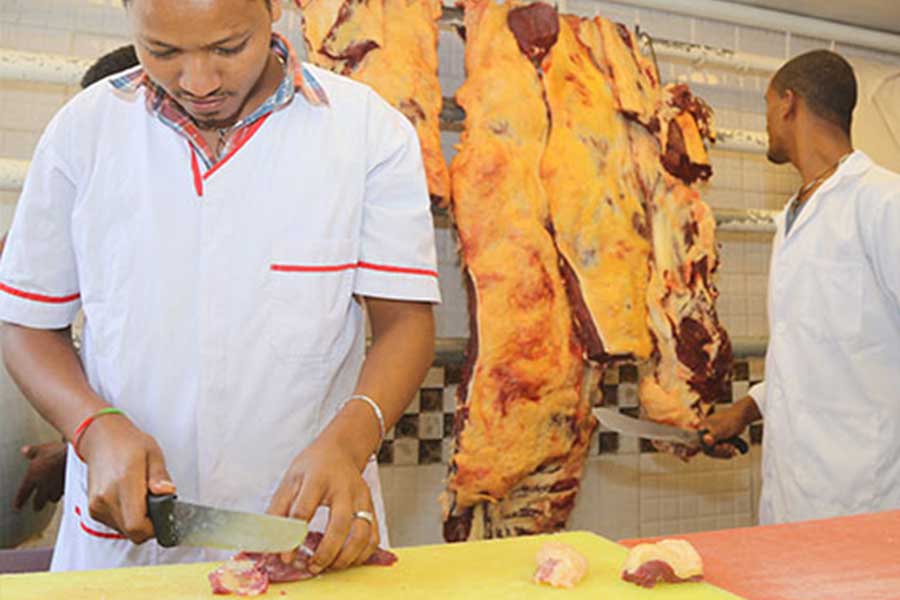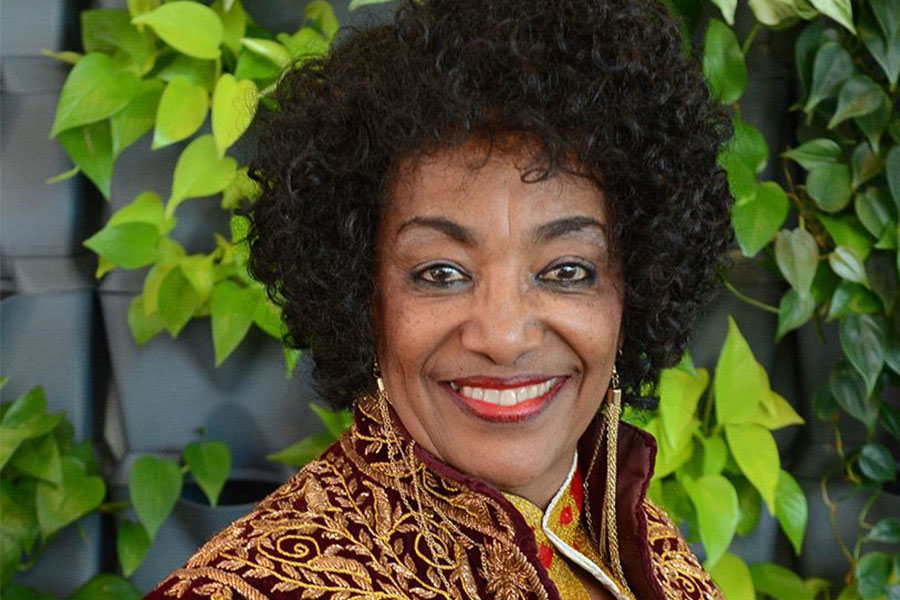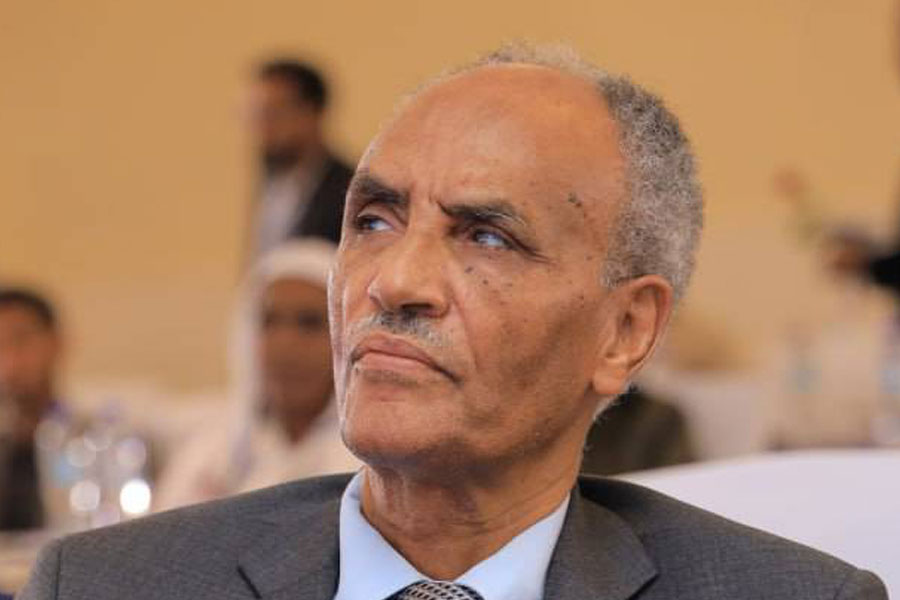
Biherawi area streets are marked with antique buildings and modern structural designs.
An orange-coloured five-storey building with a big blue sign that reads Ethiopia Hotel lettered on top lies across the National Theatre. The aged appearance of the building is apparent through faded and peeled paint on the wall.
A twin glass door opens wide, revealing two guards in grey suits ushering clients, where prominent brown couches are reposed elegantly on the left side.
Bitew Abebe (MD), 56, is reclining comfortably on one of the couches. The father of four seems to be carried away by long thoughts far from the fast-paced city life.
He works as a gynaecologist in Bahir Dar city but is called to the capital nearly thrice a month.
"This is the only hotel I stay at," Bitew told Fortune.
He had grown fond of the quietness of the rooms. Modern hotels lack the originality and aesthetics to appease his taste.
Bitew observes that the younger generation has become drawn to shiny materials and has lost the value of antiques.
"Most people acquired a love for valueless materials," he said.
Ethiopia Hotel was established in 1963 during the imperial era to host delegates who attended the capital's inaugural summit of the Organisation of African Unity (OAU). The hotel has 110 rooms, lying on 4,000 sqm. It has seen few renovations of its rooms over the years.
Expansion of the hotel has been on the drawing board ever since Belyneh Kinde (BK) Group took ownership of the hotel from the City Administration for 94 million Br in 2010.
BK Group plans to erect a twin 63-storey building on the 6,300sqm land where one of the buildings is expected to serve as a business centre while the other is presumed to be a five-star hotel.
Residents in the area were dismayed over the renovation forwarding their complaints to officials at the Addis Abeba Culture & Tourism Bureau to preserve the site. However, the expansion project continued with soil testing underway for reconstruction after tenants were compensated.
The management, under Ejigu Debebe, inquired authorities from the Bureau under Kirkos district if the hotel was registered under preserved heritages, only to find out that it would be demolished in the next few months.
"Authorities wanted its expansion more than its preservation," Ejigu told Fortune.
City officials had planned to issue certificates to buildings and structures presumed as heritage following an assessment conducted by experts from the Bureau partnering with the Authority for Research & Conservation of Cultural Heritage.
"We'll include five districts in the first assessment," said Yitaferu Kassaye, an expert at the Bureau.
According to Yitaferu, the already registered and the new heritages will be graded from "A" to "C". Buildings registered under the first-grade guarantee full assurance that they will be preserved from demolition, while the second-grade buildings have less assurance. The ones falling to the "C" grade will be put in the red zone with the possibility of being knocked down.
The Ministry of Tourism put forth a directive on the registration of valued heritages. The Ministry stipulated five criteria for prospect registration entailing historical backgrounds, architectural designs, ownership of a renowned name, existence values and time.
Officials believe that the new directive will solve the ambiguity over the preservation of buildings, serving as evidence for cases that are taken to court.
Two years ago, a two-month assessment was conducted by experts from the Bureau identifying 316 buildings as heritage sites. According to Yitaferu, registration is a possible assurance for many buildings of their historical importance.
"It's possible to negotiate if they are registered", he said.
Two properties previously belonging to Ras Abebe Aregay, a patriot during the Italian occupation, were demolished within a month of each other in 2018. Landmark sites off Churchill Avenue, including an 80-year-old structure in the National Theatre neighbourhood, were to be demolished last year, after six years of dispute over the historical value of the properties.
Samuel Bogale, general manager of Adam Construction Plc., a grade one construction company, observes that buildings have become simpler over the years requiring less design work. He observes that simplicity is becoming the norm where complicated architectural designs have been less prioritised over space.
"People care about the height than design sophistication," he said
Samuel believes hotels must align with the timeline and recommends their management consider modernising them.
"Renovating should be considered rather than destroying them," he said.
Taitu Hotel, the oldest hotel in the country, is amongst the preserved heritages that missed the plight.
It was established in 1905 by the name of Empress Taitu Betul to provide international guests with a place to rest and dine. It has been serving food and accommodation for over a century, registered thrice by the Cultural & Tourism Bureau since 2011.
The hotel has been privatized, having Fitsum Zeab as its owner, who bought it from the Privatization & Public Enterprises Supervising Agency (PPESA) over a decade ago.
The Dergue regime unravelled the extensive nationalisation of hotels putting them under the chain of administration that shifted hands to the private sector with the market liberalization and privatization policy in 1991.
Located at the heart of the Piassa area, superbly crafted wood with architectural features and an open landscape viewed from the shaded verandas make up the Hotel.
Close to 100 people visit the hotel every day. A heavy black sliding door leads to a brightly lit room and alluring music is heard from the piano at the far end of the room. Dining tables are placed on each corner with the wood floor creaking as customers walk to the buffet to fill their plates. Each plate costs 300 Br.
In 2014, an unprecedented fire destroyed the hotel's reception at Jazzamba Lounge, an entertainment centre considered to have one of the most popular live jazz bands in the capital. It was controlled within two hours but it had already destroyed the most important parts.
The cause of the fire remains inconclusive, although the Hotel began giving services after a year. A few months ago, the Hotel management under Ayalew Tadesse submitted a proposal to the Addis Ababa Culture & Tourism Bureau for renovation, including the damaged parts of the building.
"We're waiting for the green light from the Bureau," disclosed management at the Hotel.
Recent data estimate the total number of hotels in the country is close to 600. The hospitality sector is the largest industry in Ethiopia. It focuses on enhancing the tourism and hospitality sector through thriving brand hotels and destinations that play a great role in the economy.
The Ministry has been developing tourist destinations, preserving heritages, renovating museums, and promoting national parks, bringing off projects to make the country one of the top tourist destinations by 2025.
PUBLISHED ON
Apr 15,2023 [ VOL
24 , NO
1198]

Commentaries | Jun 26,2021

Life Matters | Jan 05,2019

View From Arada | Apr 20,2025

View From Arada | Aug 29,2020

Exclusive Interviews | Dec 23,2023

Sunday with Eden | Jan 28,2023

Obituary | Apr 27,2025

View From Arada | May 03,2025

Obituary | Sep 29,2024

View From Arada | Nov 16,2019

Dec 22 , 2024 . By TIZITA SHEWAFERAW
Charged with transforming colossal state-owned enterprises into modern and competitiv...

Aug 18 , 2024 . By AKSAH ITALO
Although predictable Yonas Zerihun's job in the ride-hailing service is not immune to...

Jul 28 , 2024 . By TIZITA SHEWAFERAW
Unhabitual, perhaps too many, Samuel Gebreyohannes, 38, used to occasionally enjoy a couple of beers at breakfast. However, he recently swit...

Jul 13 , 2024 . By AKSAH ITALO
Investors who rely on tractors, trucks, and field vehicles for commuting, transporting commodities, and f...

Jun 28 , 2025
Meseret Damtie, the assertive auditor general, has never been shy about naming names...

Jun 21 , 2025
A well-worn adage says, “Budget is not destiny, but it is direction.” Examining t...

Jun 14 , 2025
Yet again, the Horn of Africa is bracing for trouble. A region already frayed by wars...

Jun 7 , 2025
Few promises shine brighter in Addis Abeba than the pledge of a roof for every family...